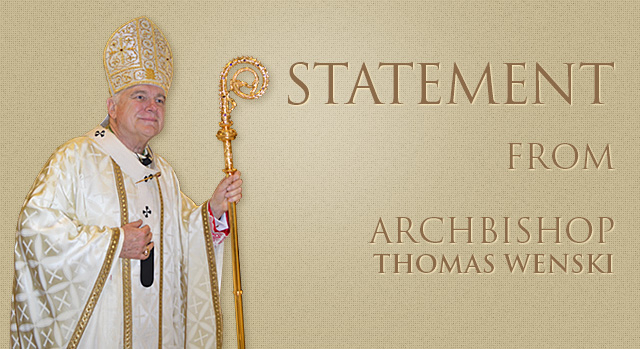By Archbishop Thomas Wenski - The Archdiocese of Miami
We live in interesting times � this month (June) Pope Francis issues his first social encyclical, Laudato Sii, dealing with ecological questions; and, the US Supreme Court will hand down its decision on same sex marriage. At any rate, both of these happenings will give us Catholics both the opportunity, and, to be sure, the duty to engage the world and witness to our teachings, to our vision of the human person, of our place and our dignity in the world which we recognized as both fallen and redeemed.
This “vision” enshrined in the Church’s moral teachings embraces what we could call both a natural and a human ecology, or what has also been referred to as “integral ecology”.
All that touches on human flourishing involves ethics and morality. “Creation care” or commitment to stewardship of the world’s resources is therefore an ethical choice. It recognizes that the earth, in the words of Pope Benedict, is “not simply our property, which we can exploit according to our interests and desires�It is, instead, a gift of the Creator who designed its intrinsic order and, in this way, provided the instructions for us to consult.” There is today broad consensus among scientists that climate change presents real threat to human flourishing on this planet. The Church cannot be indifferent. Because we believe in the Creator, the Church “has a responsibility with creation and has to fulfill this responsibility in public”.
Given that today greater numbers of people are more keenly aware of the need to protect the natural environment, these words concerning a natural ecology are generally welcomed. However, it is much more difficult today for people to connect the dots and see that there is a linkage between a natural ecology and a human ecology.
As human beings, we do not “create” ourselves; rather we are created � as the Book of Genesis says, “in the image and likeness of God”. The nature of the human being is to be a man or a woman. This order of creation also must be respected and protected if human beings are to flourish. To accept our creatureliness does not contradict our freedom but it is a precondition for its true exercise.
An integral ecology demands that rain forests be protected � because of what they do potentially and actually for the flourishing of the human species on this earth. Likewise, marriage, understood for millennia as a union of one man and one woman, ought to be respected and protected. Marriage always has been primarily about the raising of children (who seem to be hardwired to be best raised by a father and a mother who are married to each other). It is certainly legitimate then to favor such traditional marriages � in law and custom -as a way of investing in the future of society by providing for the human flourishing of upcoming generations.
Just as we favor laws that limit the danger of pollutants damaging our sensitive ecosystems, should we not be concerned about the “toxic waste” of pornography and its effects on the human ecology of the young?
Today, some hold for a radical autonomy by which truth is determined not by the nature of things but by one’s own individual will. Such thinking has brought about the degradation of our physical environment; and, it now threatens our social environment as well. In the face of increasing relativism and individualism in the wider culture, we have too often forgotten that marriage (and the family built on marriage) reflects the truth of our human nature as social beings. Our human nature � like Mother Nature itself � is a “gift of the Creator who designed its intrinsic order, and in this way provided the instructions for us to consult�” As Pope Francis said in Manila this past January citing a popular adage, “God always forgives, we sometimes forgive, but when nature � creation � is mistreated, she never forgives.”
Minimizing our “carbon footprint”, implementing sustainable farming techniques, protecting the O-zone layer, working to reduce waste and pollution are part of “Creation care” � and in attending to these things, we exercise our stewardship over the earth; but at the same time, defending marriage, promoting the family, protecting the young, are also part of the “Creation care” necessary for human flourishing on planet Earth.


Comments from readers